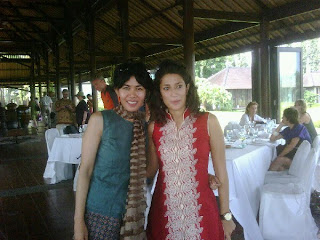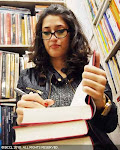TOO LEGIT TO COMPETEBeing the voice for change is a common cliché in the post-Obama world of politics. But ironically for FATIMA BHUTTO, a niece of the assassinated former prime minister of Pakistan Benazir Bhutto, change is exactly why she stays out of politics. SHANNON TEOH finds her readier to document rather than represent
WHAT’S IN A NAME? In Pakistan, damn near everything.
If you thought having Bush Sr. and Jr. as presidents was something, the unauthoritative but extremely useful
Wikipedia actually has a page dedicated to “Political families of Pakistan.” There are 14 of them, and under Bhutto, we find 21 names said to be “in politics.”
One of them is Fatima Bhutto, who, once she finds out about this, will probably protest her inclusion.
The Bhutto name needs no introduction to an international audience, let alone to 180 million Pakistanis brought up in a democracy which makes no apologies for its dynastic inclinations. Such is the grip of this mindset that on various internet forums discussing interviews where Fatima rejects suggestions that she gets contest in elections, Pakistanis are extolling her virtues and stating openly that they would support her wholeheartedly.
Pointedly, some will even go so far as to say that it is Fatima’s destiny, and not that of her 20-year-old cousin Bilawal Bhutto Zardari, son of the assassinated former prime minister Benazir Bhutto, to inherit the family’s political leadership. One rationale is particularly illuminating—Bilawal is not a real Bhutto but a Zardari.
So the apologies are left instead to the 27-year-old poet and journalist.
“My decision not to take part in parliamentary politics is absolute,” she said in a telephone-interview from her home in Karachi.
“You can quote me on that, Shannon,” she added for emphasis, clearly frustrated at constant speculation that she will eventually make a tilt for a top role in government and in at least once case, she claims of rather mischievous reporting.
I was referring to a news report where Fatima had appeared to leave the door open should birthright politics be dismantled and an open field established, but Fatima claimed it was a case of “two separate things being pieced together.”

“It was a separate question asking if I lived in a country without a feudal background and I didn’t come from a dynasty. So I said that if that was the case, in an ideal situation, then of course, it’s an entirely different proposition,” she explained.
Fatima has been critical of birthright politics for as long as she had a platform to do so and today does so in Pakstasni media as well as columns in
The Daily Beast and
New Statesman, and commentaries in
The Guardian. In our interview, she decried as “farcical” that Pakistan has been “devastated” by the idea that “all you need that qualifies you to rule is a name.”
“It can even be an add-on name, somewhere in the equation and you are suitable,” she scoffed.
Instead, she has been pushing for, mainly through her writing, the voiceless to be empowered and have Pakistanis being represented by members of their own constituencies and communities.
“I am happy to play a role from the sidelines, to write and support causes I believe in and speak out against those I feel are dangerous and leave the actual politicking to someone else,” she said.
But the irony in her quest for a change to a democracy based on merit is nearly tragic in its immensity. She even sounded like she was tasting it as she said “it behooves me—(she pauses for an exasperated chuckle)—to say, I will not participate.”
Because the fact is that she does come from a dynasty and the Bhutto name is an inescapable soapbox for her. Fatima also helps her stepmother, Ghinwa Bhutto, to campaign during elections—although it would be unfair to say that Ghinwa rides on the Bhutto name given that she heads a dissenting breakaway party from the Pakistan People’s Party, which is practically a Bhutto heirloom. Fatima’s highly recognisable profile, is as much due to her surname as it is her columns in various newspapers, multiple appearances on television, two books and, well, the loud whispering in the gossip rags featuring one George Clooney.
This is not to say her work has no validity once you cut the cords of family, but it is undeniable that it is a key selling point and gives Fatima greater relevance. She must know this, of course. Next year, her third book will be published and it is about “the violence that connects Pakistan and my family.”
“It weaves itself between this country and this family, making it part historical, part journalistic and also part personal. It’s my way of trying to understand the violence that I‘ve lived with personally and as a Pakistani,” she said and at the time of the interview, she was still being kept up most nights by the lack of a title.
It becomes obvious that any naivety in her cause or work so far is only due to the very nature of her social and political activism. Hope—usually against all hope—is what keeps the underdogs going, after all.
But again, it is cruel irony that hope is probably why Pakistanis want to see her in government. Fatima agrees that it is difficult to blame Pakistanis for what is essentially “hope and expectations” derived from “a relationship with the family.”
“You can’t eliminate hope, as Barack Obama would say, there is nothing false about hope,” she said, quoting the US president.
The problem with hope in Pakistan, she believes, is that it creates a situation where “they just decide, we don’t like Musharraf (the self-appointed former president who led a military coup d’etat), we want someone else and we’ll take just about anybody at this point.”
Her hope is that all this can change and is reflected in her pursuance of what she calls “the hidden transcript.” She related her first visit to Malaysia a year ago, saying she found the people “very warm and open, eager to share, talk and discuss.”
“The same is true in Pakistan, but when you open the newspapers, none of that is reflected in them. It is as if the people in power are on one side, and the people you meet everyday are on the other. You feel there is a disconnection,” she mused.
“I think of what I do as citizen journalism. I’ve never liked the idea of being a columnist or commentator. Instead, I wrote about things I was living in and witnessing but not seeing on television or reading in newspapers.
“I liked the idea of coming from inside a society, of it being rogue in some kind of way—what I was doing was to archive and catalogue. So there are two transcripts out there of what is recorded. The established transcript in state newspapers and TV, and then the hidden transcript of how people live and what life is like and their struggles,” she explained.
This was the motivation behind
8:50am 8 October 2005, published three years ago about the earthquake in Pakistan’s north that killed some 80,000 people. The fact is documented well enough, but Fatima found that the stories that needed to be told were those of the survivors.
“When I went to the earthquake area on personal trips to distribute aid to women and children, I was shocked that the things people told me were news I hadn’t heard on the TV or newspapers. There was a lot of attention but it was always politicians or newscasters speaking for people portrayed as silent victims.
“But the people I met were not victims at all. They were survivors and they were resilient, very gutsy and impassioned about what happened and what needed to be done. I wasn’t seeing that anywhere else,” she recalled.
It would be easy to psychoanalyse Fatima and say that this is simply a typical condescending upper-class reaction to her privileged upbringing where her first book was a collection of poetry written in her pubescent years. That may not be a completely invalid point, as Fatima herself admitted, but it would be one that is completely unsympathetic to the (c)rude interruption of those pubescent years by the death of her father.
It was half a life and while she still writes poems—a full collection remains unpublished—she has found a modus operandi and a purpose that she has utter belief in.
In hindsight, Fatima believes that her citizen journalism is when she really found her voice as a writer and “started to write as an adult; the poetry was from when I was a child, really.
“Nobody was talking about what it was like on a daily basis, living through something. For me, as an adult, by the time I started to work on the earthquake book, I knew that was what I wanted to do. If there was a way to uncover the hidden transcripts, then I wanted to be involved in doing that.
“I didn’t want to put myself necessarily in the front—I wanted to share my experiences and what I thought about things, but I didn’t need them to be about me. Coming from a political family and that kind of background, it was an important realisation for me to make and that was really when it became clear to me that I wasn’t going into politics, that I had more of a role to play through writing and activism,” she said.
Time will tell if her efforts will prove to be wanting or even in vain in the context of Pakistani politics. But insisting that journalists and writers, not politicians, were her heroes while growing up, her presence at the Ubud Writers & Readers Festival 2009 is a testament to a larger truth, that even if journalism or literature may not always change the destiny of the world, it can change the destiny of lives.
Even if it’s only the life of the writer.
SHANNON TEOH, when not pretending to know everything, busies himself trying to have a laugh. Some might argue they’re both the same thing. However, this winner of several Boy Scout badges would argue that the first provides him with a salary at
The Malaysian Insider and the latter ensures he never gets a second date. Or was it the other way round?
Reproduced from the Ubud Writers & Readers Festival 2009 issue of Quill magazineSource:http://goodbooksguide.blogspot.com



































